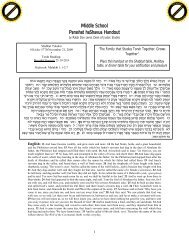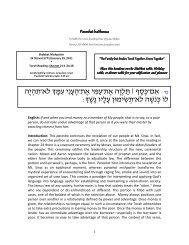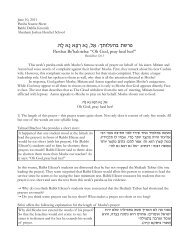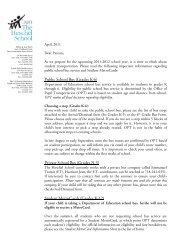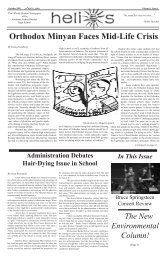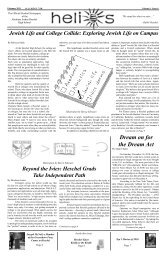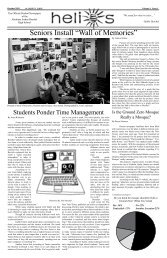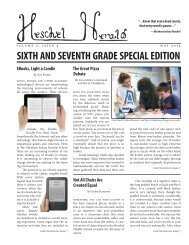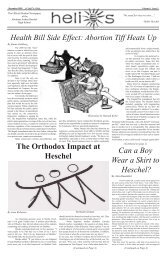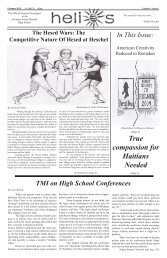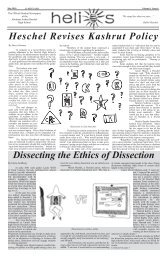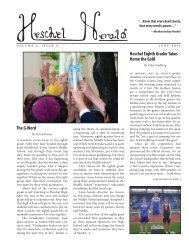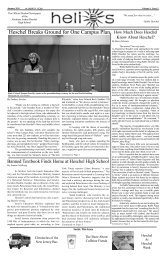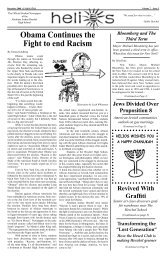Shelah - The Heschel School
Shelah - The Heschel School
Shelah - The Heschel School
You also want an ePaper? Increase the reach of your titles
YUMPU automatically turns print PDFs into web optimized ePapers that Google loves.
“seeing” or “looking,”/ro’im, and, “impulsivity,” (even “adulterous” behavior, or<br />
“lascivious” behavior, in its strongest connotation)/ zonim/zanu. This constellation of<br />
words repeats throughout chapters 13-14. <strong>The</strong> scouts enter to look and see the qualities of<br />
the land, its inhabitants, its produce, its terrain. <strong>The</strong> military context of scouting the land<br />
prior to an incursion is immediately recognized as metaphorical as well as practical.<br />
<strong>The</strong>re is nothing unusual about sending scouts to determine the best advantage for an<br />
attack in a military campaign. This expedition, however, results in a passionate split over<br />
the viability of the entire operation, with theological implications. <strong>The</strong> majority of the<br />
scouts not only fail to find military egress; they demand the people return to the<br />
oppression of Egypt where they can rely on a security of their daily routines. Only two<br />
scouts object strenuously. God experiences this report a blasphemous rejection of the<br />
relationship God has tried to establish with Israel, and threatened to destroy them all and<br />
begin building a relationship with a different group of people, preserving Moses as their<br />
leader. Moses has to help God see a larger picture, which he does by invoking what the<br />
rabbis called the 13 attributes of God’s character. <strong>The</strong>se attributes emphasize God’s<br />
patient, non-judgmental character. (God needs reminding.)<br />
<strong>The</strong>se attributes were invoked once before, when God threatened to destroy the<br />
nation in the wake of their having created and celebrated before the golden calf. This fact<br />
itself suggests that God sees these two actions: the worship of the calf, and the rejection<br />
of the opportunity to enter and settle the land of Israel, as parallel! In other words, failure<br />
to settle the land of Israel is as much of a rejection of the opportunity to actualize God’s<br />
vision for our people as turning our backs explicitly on God by becoming pagans. I think<br />
this is because only by settling the land of Israel can the Jewish people build a society<br />
with complete autonomy and power and responsibility for every decision we would<br />
make. Only in the land can the Jewish people potentially build a society which would<br />
reflect God’s hope and vision for humanity. God has set God’s hopes on us to accomplish<br />
this task. If this is the covenantal purpose of the Jewish people, then the land of Israel<br />
becomes the central tool for the execution of this purpose. Paganism has no integrated,<br />
covenantal vision for the world; paganism projects a self-serving, fragmented world<br />
view. Living in covenant is supposed to project an integrated holistic world-view which<br />
sanctifies life in its many diverse dimensions.<br />
Moses succeeds. Instead of destroying the nation, God decrees that the generation<br />
will lose a year for every day of the scouting expedition: 40 days will turn into 40 years,<br />
resulting in the conquest of the land falling to the second generation while the elders<br />
perish in the midbar. This decision, of course, sets the stage for the people to struggle<br />
with their own character as an incipient nation. It is in the wilderness that our ancestors<br />
learn their own character. It is in the wilderness that they wrestle with the nature of<br />
leadership, experience transitions, encounter the challenges of Midianite cultural<br />
seductions and negotiations with other nations. <strong>The</strong> experience of leaving Egypt and<br />
living in the midbar transforms a group of slaves into a nation, with an administrative<br />
structure and sense of sacred purpose. It is in the wilderness, in galut, in exile, that the<br />
people receive the Torah, construct the mishkan, and learn to tolerate the challenges to<br />
faith, vision, and loyalty.<br />
<strong>The</strong> final section of this parasha, the teaching of wearing tzitzit on four-cornered<br />
garments, is organized around the same core vocabulary as the scouting expedition:<br />
zonim/acting impulsively by following values which would seduce one away from the<br />
2



